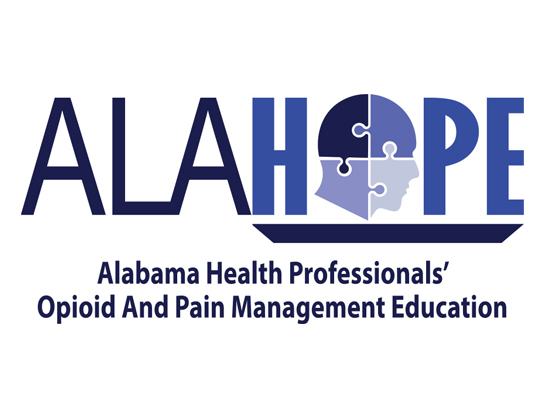 The Jefferson County Department of Health, Alabama Board of Medical Examiners, University of Alabama at Birmingham School of Health Professions and Auburn University Harrison College of Pharmacy have collaborated to provide a curriculum to promote best practices of safe opioid prescribing and dispensing appropriate for use by all health care professions schools in Alabama.
The Jefferson County Department of Health, Alabama Board of Medical Examiners, University of Alabama at Birmingham School of Health Professions and Auburn University Harrison College of Pharmacy have collaborated to provide a curriculum to promote best practices of safe opioid prescribing and dispensing appropriate for use by all health care professions schools in Alabama.
ALAHOPE, Alabama Health Professionals’ Opioid and Pain Management Education, is a comprehensive, asynchronous, multimedia, standardized, unbiased and modular online training tool funded by the JCDH, through the Overdose Data to Action Grant from the Centers for Disease Control and Prevention. It was created out of the Alabama Opioid Overdose and Addiction Council, established by executive order of Alabama Governor Kay Ivey in 2017.
“Alabama has suffered disproportionately from opioid addiction, which is why, in 2017, I ordered the establishment of the Alabama Opioid Overdose and Addiction Council to find solutions to this health crisis,” Ivey said. “One of the Council’s recommendations was to ensure all medical professionals have access to protocols for prescribing opioids for pain treatment. The launch of the ALAHOPE program will go a long way in that effort by incorporating opioid and pain education into curriculum of health care training in the state.”
ALAHOPE will help tomorrow’s health professionals gain awareness and knowledge and position them to contribute to the solution that plagues people in the community — opioid overdoses and deaths.
ALAHOPE was created for students across Alabama in any type of health professions program that may play a role in preventing or treating patients with substance use disorder and/or pain. This would include students in school to become physicians, nurse practitioners, pharmacists, physician assistants, dentists, physical therapists, occupational therapists, podiatrists, optometrists, counselors and social workers.
ALAHOPE also offers free continuing education credit for those practicing in many of these professions, with optometry and podiatry pending.
“Everyone recognizes the importance of this type of education for our health professions students, but nobody has the resources to create it themselves,” said Darlene Traffanstedt, M.D., medical director at the JCDH. “We had a forum for this program and the schools contributed their expertise — without being paid or reimbursed, and in the end we provided a final product of a curriculum that is free to everyone. This is truly a wonderful, shining example of interagency collaboration of governmental agencies’ working together to make things better for our state.”
Alabama remains the highest opioid-dispensing state in the country, but significant improvements have been made. In 2012, the state reached a peak of 143.8 opioid prescriptions dispensed for every 100 people in Alabama. In 2020, that number has decreased to 84 opioid prescriptions dispensed for every 100 people.
After analyzing previous curricula to identify common trends in substance use disorder and pain management education, UAB School of Health Professions professor Sue Feldman, Ph.D., graduate research assistant Heather Martin and Traffanstedt published a content analysis of the potential opportunities available through ALAHOPE in Southern Medical Journal in January 2023.
“ALAHOPE is an incredible project,” Martin said. “Being able to contribute to something that spans across the landscape of all health professions in our state is very special. This project will have a high impact and influence way beyond the learning environment.”
Currently, there are 12 lectures focusing on substance use available with more to be added, along with development of a unit on the treatment of pain.
More about ALAHOPE can be found online at www.alahope.org.
This project/website is supported by the Centers for Disease Control and Prevention of the U.S. Department of Health and Human Services (HHS) as part of a financial assistance award totaling $179,375.00 with 100 percent funded by CDC/HHS. The contents are those of the author(s) and do not necessarily represent the official views of, nor an endorsement, by CDC/HHS, or the U.S. Government.